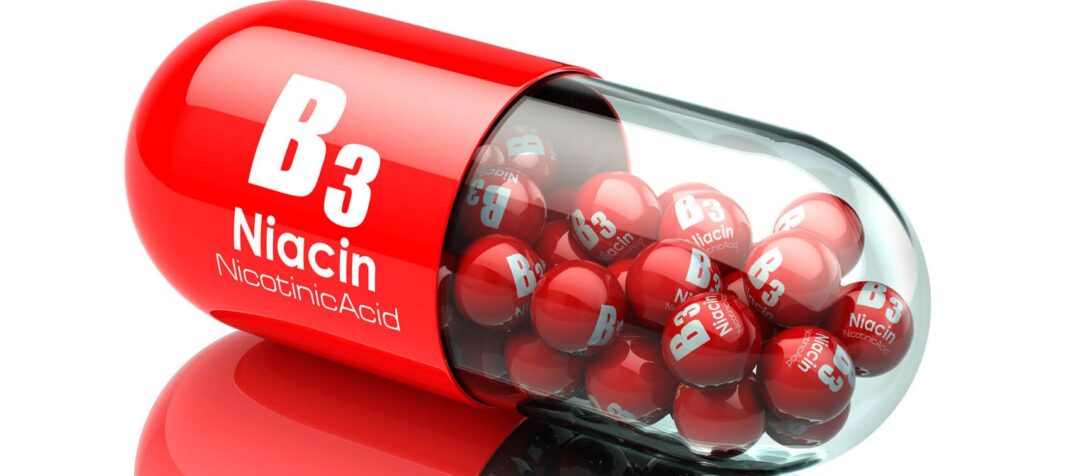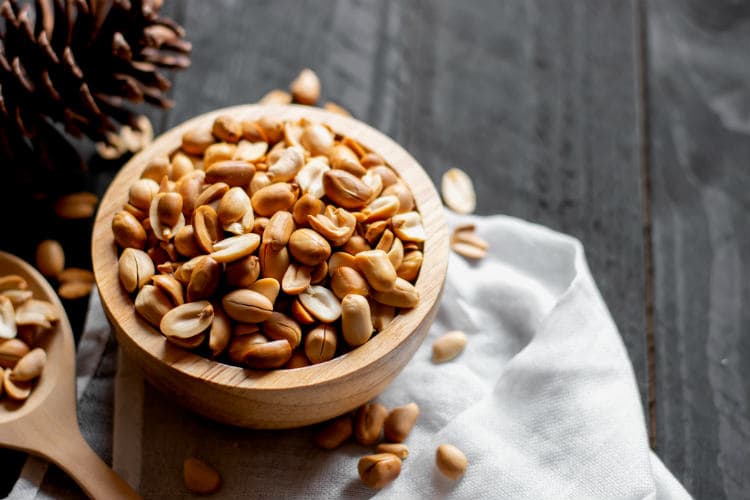Niacin Health Benefits
What is Niacin?
Niacin is a form of water-soluble vitamin known as vitamin B3. It is found naturally in green vegetables, eggs, meat, fish, yeast, and cereals.
Sometimes along with other vitamins, it is taken as a supplement. Our body makes Niacin from tryptophan which is present in protein-rich foods.
Two forms of Niacin are commonly known as;
- Niacinamide
- Nicotinic acid
Both of these forms are made available through food items and supplements.
The primary role of Niacin in our body is to synthesize the coenzymes such as,
- Nicotinamide Adenine Dinucleotide (NAD)
- Nicotinamide adenine Dinucleotide Phosphate (NADP).
These coenzymes are vital for almost 400 biochemical reactions in our body relating to deriving energy from our food.
Since Niacin is a water-soluble vitamin, our body does not store it, and any extra vitamin that our body can’t use passes through our urine.
How Does it Work?
Our body absorbs Niacin when taken by mouth after dissolving in water. But when we overdose on Niacin, our body converts it into niacinamide.
We need Niacin for the functioning of fats and sugars of our body and also to maintain our healthy cells. Like all other B vitamins, Niacin also helps convert energy from food with the help of enzymes.
NAD and NADP are the two enzymes that encourage cellular metabolism. Not only this, but Niacin also acts as an antioxidant and helps repair DNA, cell signaling, and making.

Benefits of Niacin
It improves blood fat levels.
There are three ways in which Niacin can improve our body’s blood fat levels:
- By increasing the HDL or good cholesterol level.
- By decreasing the LDL or bad cholesterol level.
- Reducing the triglyceride levels.
Doctors keep Niacin as only a second option to reduce blood fat and cholesterol levels in those with whom single-drug therapy doesn’t work.
And also, dietary Niacin is of less concentration and will not be enough to reduce cholesterol. So to lower cholesterol levels in the body, a higher concentration of Niacin is what we will need.
Reduce Blood Pressure.
Niacin helps to release prostaglandins that widen the blood vessels, thus improving blood pressure and flow. This is why Niacin has a role in reducing blood pressure levels.
May Treat Diabetes (Type 1)
Type 1 Diabetes is a chronic disorder where your body destroys the cells that create insulin in the pancreas. It may help protect the cells and reduce the chances of Type 1 diabetes in children and adults.
Improves Brain Function.
Our brain needs Niacin to improve energy and function in coenzymes NAP and NAPD. Unfortunately, Niacin deficiency may also cause brain fog and psychiatric issues.
Some research shows that Niacin helps treat Alzheimer’s and Schizophrenia patients. However, these criteria need further research to establish a solid point.
Improves the texture of the skin.
Whether you apply Niacin in the form of sprays or cream, it helps to protect the skin from sun damage. In addition, when used as a topical treatment, it can clear acne and reduce inflammation.
It helps to reduce joint pain.
Vitamin B3 helps reduce joint pain, swelling, and inflammation with the help of niacinamide. Since it is suitable for joints, Niacin is helpful to treat arthritis patients.
Aids in Digestion.
Niacin is also very good for digestion because it helps the stomach break down fats and carbs. Niacin deficiency may cause digestion as well as gastrointestinal problems.
May Prevent Erectile Dysfunction.
Since Niacin helps widen the blood vessels, it may also help prevent erectile dysfunction by enhancing the blood flow through the penis.
What Are The Sources of Niacin?
Niacin is a vitamin found in many fruits and vegetables and quickly be taken just through food sources. Therefore, you can make these food items a part of your everyday diet.
Here are some food items that are excellent sources of Niacin:
Chicken Breast.
Tuna.
Liver.
Salmon.
Turkey.
Anchovies.
Ground Beef.
Pork.
Peanut.
Brown Rice.
Avocado.
Green Peas.
Whole Wheat.
Mushroom.
Potatoes.
Fortified Enriched Food.
Dosage and Precautions
According to Recommended Dietary Allowance or RDA, niacin dosages should be 16mg for men and 14mg for women. The dosage is 18mg for pregnant women, and for a breastfeeding woman is 17 mg. Therefore, you can easily cover all these dosages with a healthy balanced diet.
Pregnant and breastfeeding women should not exceed the RDA’s daily limit of Niacin.
You can also take niacin supplements if you feel like your diet is missing on these food sources that have Niacin. The concentration of Niacin will be higher when used to treat patients with high cholesterol. Before taking any niacin supplements, make sure that you consult with your doctor.(1)
Niacin may react with a few things like alcohol, blood pressure, and diabetes, hepatotoxic drugs, and statins. So, if you are consuming any drugs to treat these conditions, it will be better to stay away from niacin supplements.
Those who have Crohn’s disease, Diabetes, Gall Bladder, Gout, or liver disease should not take niacin supplements without consulting their physician.
Side-Effects of Niacin
Even though Niacin is an essential vitamin that the body needs, let’s not forget that Niacin can also be harmful if taken in excessive quantity. However, there won’t be any side effects if you get Niacin from only food sources.
However, the problem starts when you take Niacin as a dietary supplement and in high doses.
Here are a few common symptoms that you may experience if you have a Niacin overdose.
- Nausea
- Diarrhea
- Flushing
- Increased cough
- Itching and dry skin
- Redness
Niacin, or vitamin B3, is an essential nutrient that our body can’t store or make. So we need to get enough Niacin through the food we eat.
Niacin plays a critical role in our nervous system’s function and improves digestion.
Niacin is also beneficial for joints, blood pressure and for lowering cholesterol levels. In addition, the food sources that have Niacin are available both in vegetarian and non-vegetarian diets. Therefore, including Niacin in your diet will help your overall health and well-being.





